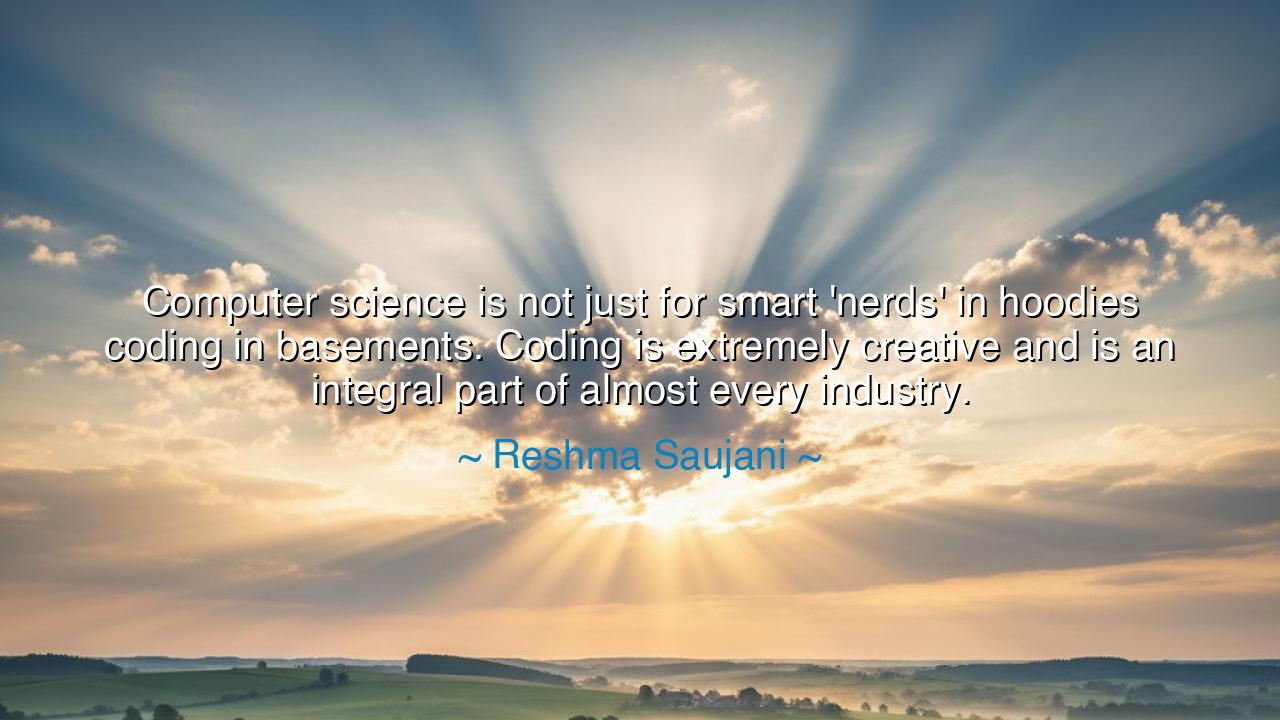
Computer science is not just for smart 'nerds' in hoodies coding
Computer science is not just for smart 'nerds' in hoodies coding in basements. Coding is extremely creative and is an integral part of almost every industry.






Hear me, O Seekers of Knowledge, for the words of Reshma Saujani resonate with a powerful truth about the nature of computer science and its role in shaping the world: " Computer science is not just for smart 'nerds' in hoodies coding in basements. Coding is extremely creative and is an integral part of almost every industry." These words call us to recognize that the pursuit of computer science is not confined to a select few but is a gateway for anyone with the courage to embrace it. Coding, far from being a dry, technical skill, is a creative force, one that empowers individuals to shape the world, solve problems, and bring their ideas to life.
In the ancient world, there was no distinction between the arts and the sciences. Think of Archimedes, the brilliant Greek mathematician and inventor, whose discoveries in the fields of physics and engineering were deeply creative. Archimedes was not simply a mathematician—he was a visionary, using the principles of mathematics to solve real-world problems and design machines that would change the course of history. Just as Archimedes used his creativity to fuel his scientific endeavors, so too can coding be a powerful form of creativity—a tool that, when wielded with vision and purpose, can create solutions that transform industries, economies, and even societies.
Saujani’s words challenge the misconception that computer science is a solitary, technical pursuit. For coding is more than just stringing together lines of code. It is about creating something new from nothing, shaping ideas into realities, and solving problems with elegant, innovative solutions. It is the language of the modern world, and just as writing once enabled the spread of knowledge and the creation of civilizations, so too does coding enable the progress of human society today. Coding is not confined to a dark basement or a small group of self-proclaimed “nerds”—it is a universal skill, one that bridges gaps and opens doors across industries, from healthcare to art, from finance to education.
Consider the story of Ada Lovelace, the 19th-century mathematician who is often considered the first computer programmer. Lovelace saw the potential of the analytical engine—a mechanical device conceived by Charles Babbage—not just as a calculating machine, but as something far greater. Her visionary thinking led her to write the first algorithm designed to be processed by a machine, laying the groundwork for what would become modern computer science. But Lovelace was not just a mathematician—she was a creative force, a woman who could see beyond the technical aspects of the machine to the ways in which it could be used to change the world. Her story is a powerful reminder that computer science is not merely a technical pursuit but an act of creative vision that has the potential to shape the future.
The lesson that Saujani imparts is not just about coding, but about breaking down the barriers that often surround the world of technology. Too often, the field of computer science is portrayed as an exclusive domain for a select few—a realm inhabited only by the “smart nerds” who seem to have a natural affinity for logic and algorithms. But Saujani challenges this stereotype. She reminds us that coding is for everyone—it is a skill that anyone can learn, and when applied creatively, it can open doors to new worlds of opportunity. It is an integral part of almost every aspect of our lives, from the apps we use to the healthcare systems that keep us healthy, from the businesses that drive our economy to the artistic creations that inspire us.
Saujani's insight urges us to recognize that creativity is not confined to the arts, nor is technology purely technical. The two are intertwined, and in the world of computer science, creativity is at the core. Just as a sculptor brings a block of marble to life with a chisel, so too does a programmer bring code to life with creativity, turning abstract instructions into solutions that change the world. The very nature of coding is creative—it is about building, experimenting, and pushing boundaries. Every line of code is a stroke of a brush, a note in a symphony, a word in a story, all working together to create something greater than the sum of its parts.
The lesson, O Seekers, is clear: computer science is not a cold, technical pursuit—it is a form of creative expression. Whether you seek to solve problems, build something new, or explore the world through the lens of technology, coding is a powerful tool that can bring your ideas to life. It is a skill that anyone can learn, and it opens the doors to endless possibilities. Let your imagination guide you, and know that technology—like any form of creativity—holds the potential to change the world.
In your own lives, O Children, remember that the creative spirit is not limited to artists and musicians. It is alive in every corner of science, in every line of code, in every problem solved. Do not shy away from learning the language of computer science, for it is the language of innovation, the key to unlocking the solutions of tomorrow. Let technology be your tool, and let creativity be your guide. With both in hand, you have the power to shape a future that is brighter, more innovative, and more inclusive than ever before.






AAdministratorAdministrator
Welcome, honored guests. Please leave a comment, we will respond soon